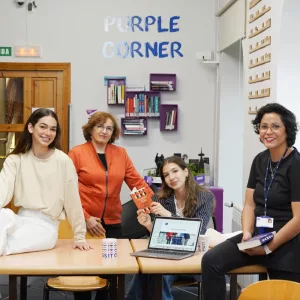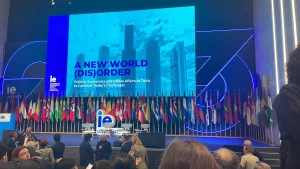On Wednesday, January 25, IE University’s Talent and Careers department hosted its first in-person Intergovernmental Organizations (IGO) Day, an opportunity for students to explore career options in International Relations and development fields. Last year, IGO Day was launched online with plans to host it annually. As such, the Talent and Careers Department is working to further connect students with employment opportunities within IGOs.
The event kicked off with a panel of professionals discussing trends in the IGO job market. The panel was composed of four high-ranking professionals in some of the most influential IGOs: Michael Emery, the Head of Human Resources of the International Organization for Migration (IOM), Dora Csordas, the Global Outreach professional for the United Nations High Commissioner for Refugees (UNHCR), Victor Vazquez, Head of Section for the Coordination of Developed Countries at the World Intellectual Property Organization (WIPO), and Richard Aiello, the Chief HR Business Partner for the International Fund for Agricultural Development (IFAD).
Attended by around 100 people, the lecture room on floor 4 was crowded with students waiting to hear from experts from these organizations. Although the IGOs vary in their areas of focus, their representatives agreed on clear trends in the IGO job market: sustainability, technology and a change in geographic focus. For students looking to pursue a career in IGOs, Emery advised, “follow the money. I don’t mean follow big salaries, but where money is flowing thematically and geographically.” Emery, therefore, encouraged the professionals of the future to look where investment occurs, even if that means taking risks.
Similarly, the representatives of the IGOs agreed on the significance of competency-based interviewing. Being multilingual is as important as ever, but what will make a candidate stand out is an ability to illustrate professional presence. This includes communication and media skills, such as showcasing professional accomplishments on social media platforms, including LinkedIn. Furthermore, students were advised to enter interviews with a narrative in mind, or an idea of how one can individually add value to the IGO in question. This narrative can be derived through specific proposals, skills or reflections, such as an understanding of how one was able to solve conflicts in the past.
Following the first panel, students were invited to the IGO fair, where they could interact with representatives of ten IGOs. As expected, many of these conversations surrounded possible internship opportunities. Many IGOs offer traineeships or internship programs to students who have already graduated from their Bachelor’s program. Nonetheless, the fair was an opportunity for students to prepare for the future by asking what these organizations are looking for, getting advice for the application procedure and gaining a contact person for further questions. As such, the fair shortened the distance between students and their career interests.
To end IGO Day, a second panel was held to discuss ways in which students can increase their eligibility for jobs in IGOs by succeeding in their applications. Given the competitiveness for positions within IGOs, it is helpful to simplify the procedure in order to increase one’s chances. One main focus of the human resources representatives of the IGOs was the immense importance of tailoring one’s resume to the job in question. Oftentimes, students fear that their lack of experience, and specifically relevant experience, may be a barrier to their eligibility. However, the representatives expressed that even experiences that may not seem directly relevant at first glance can showcase important skills. For example, although work experience in a bar is not related to international relations, it can nonetheless illustrate communication skills, stress resistance and an ability to adapt to different people, cultures and situations.
As such, for students with an interest in working in this field, IGO Day offered important networking and educational opportunities. As Emery stated, we need “to look at old problems with a new lens.” Hopefully, many IE students will pursue exactly that in the future.
Featured image by: Doomu, retrieved on iStock







